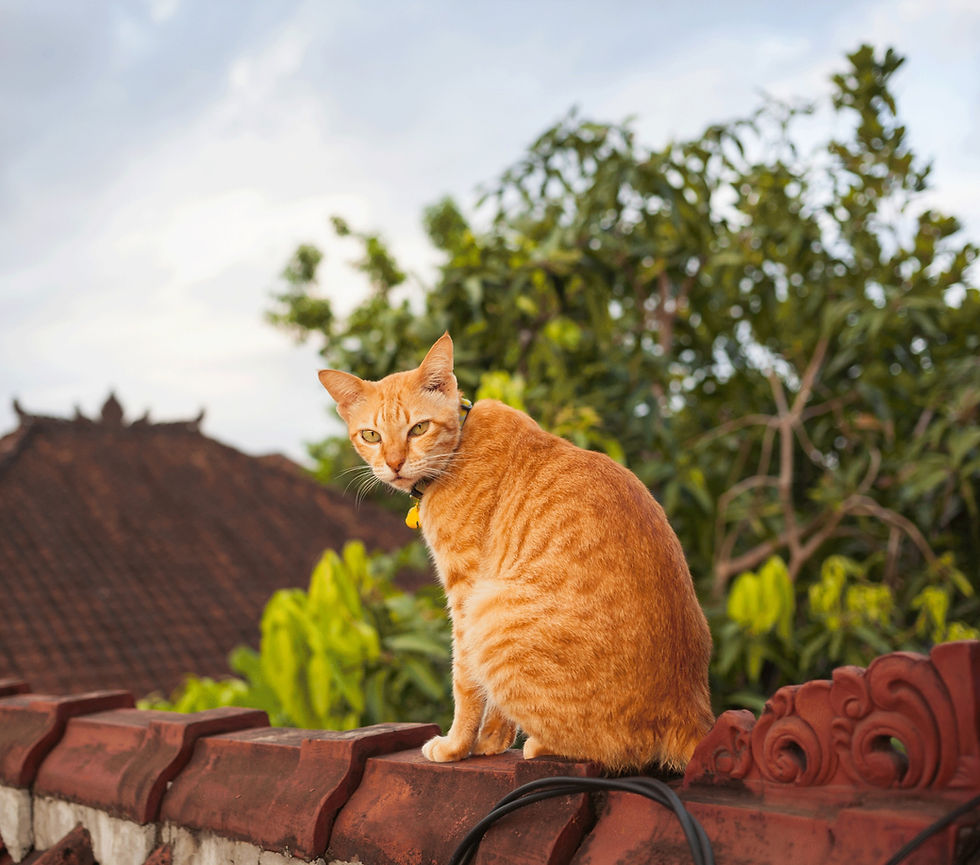NOTE: There is a meowing sound that emanates from somewhere above the heads of myself and my coworkers in Suite 104. One autumn day, as we gathered for a time of fellowship and a good meal, I shared the story of ghost kitty as an explanation for the sound that, to this day, still haunts our halls.

Julius Caesar Carpenter was a second generation American and at the tender young age of 17 had decided he was going to enter the war and fight for his country. America had entered the second World War in 1941 and by 1944, the people were faced with tightening rations, bond sales, scrap metal collections and soaring patriotism.
Caesar lived on East First Avenue, in a quaint white cottage not far from the Etowah River. After school at Rome Boys High, Caesar would catch fish in the river, play ball on the sandlot near by and watch the girls window shop on Broad Street.
It was on the Etowah riverbank that Caesar first saw the marmalade kitten. She was scrawny and muddy and scared. Caesar lured the orange ball of fur over with the last bite of his lunch one Saturday, tucked her into his coat and walked the short distance home. He gave the kitten a bath, which she didn’t much care for, and settled on her name – Punkin. It was, after all, October.
Punkin fattened up, and made herself at home, earning her room and board by keeping the house and yard free of mice and other such critters, and she became a welcome friend when more and more of Caesar’s buddies went off to war.
Finally, it was Caesar’s time. He didn’t have to be drafted. He joined the Navy as soon as he was old enough. He knew he wanted to be in the Navy. Being on the water would remind him of being at home on the Etowah, he figured.
Punkin didn’t understand Caesar’s departure. She prowled East First Street and the banks of the Etowah day after day looking for her friend, crying out for him. Folks in the neighborhood helped care for Punkin, giving her treats and head scratches, but Punkin who never stopped crying out and kept a steady patrol, looking for her beloved Caesar.
About six months after Caesar had joined the Navy, a Red Cross truck pulled up to the Carpenter’s house. Everyone on the street knew what that meant. And, seemingly, Punkin did too. She listened as the uniformed man spoke gently and watched as Caesar’s mom cried. It was Halloween. No jack o ’lantern glowed from the Carpenters’ front porch that All Hallows Eve, and rather than trick-or-treaters, a steady stream of neighbors appeared at the door bearing casseroles and hugs.
Everyone who stopped by asked about Punkin, but the now-grown orange cat was nowhere to be found. That night, someone heard a slight meow that seemed to come from upstairs. Mr. Carpenter investigated and found Punkin. She had climbed into the attic where she could see out the highest gable window, watching for her beloved Caesar. He tried to coax Punkin to come downstairs, but she refused.
Each morning and each evening, she would cry mournfully as she looked out the gable window, searching for Caesar, but Punkin never came out of the attic; and she never ate again.
Punkin didn’t last much longer herself. Caesar’s daddy found Punkin’s lifeless body and buried her beneath the tall pines in the backyard. He even put a little cross and one of those small American flags at the head of her shoebox grave, but Punkin never really left the Carpenters.
Every morning and every evening, a faint meow seemed to come from the Carpenter’s attic. At first, Caesar’s parents dismissed the sound as the wind or a branch scraping against a window, but the regularity of the lonely cry convinced them otherwise.
One evening, right after supper, Mrs. Carpenter heard the sound and stepped outside into the chilly dusk. She looked up at the attic window and saw a ghostly silhouette – two pointy ears and thick undulating tail. She caught her breath. It was Punkin, or at least her spirit.
Punkin never left East First Avenue. An office building now sprawls across the block where the Carpenter’s home and the homes of their neighbors once stood. To this day, each morning and each night, especially as the days grow shorter and Halloween approaches, workers swear they hear Punkin’s plaintive cry.
If you’ve ever been in Suite 104 – where my office is – early in the day or at late in the evening, when the air is still and the offices are quiet, you’ll hear the mournful, melancholy cries of ghost kitty.
She is waiting for Caesar, the boy who rescued Punkin, the marmalade cat.
Comments